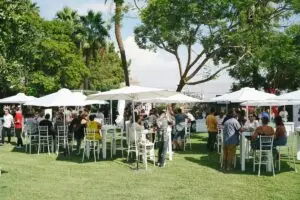How to create your event budget (and why it’s important!)

In this quick guide, I’ll cover:
How to create an event budget (and why it's important!)
Your event budget is one of the most important aspects of planning your event. If you don’t plan your budget correctly, you could run out of money very quickly and find yourself having to ‘make do’. Or, you could lose track and drastically overspend.
Make sure that you do not run the risk of eating into your profits by overspending. Or, produce an underwhelming event because you ran out of money!
How can a budget help with my event?
Creating an event budget can seem like a daunting task – but it doesn’t need to be. And taking the time to create a bespoke budget for your event has many advantages, such as:
- Ensuring that you are spending your budget on the things that matter the most to your business and event
- Reduces unnecessary expenses
- Identifies the ‘nice to haves’
- Tracks any income sources (ie. event sponsorship, ticket sales or commissions)
- Eliminates inefficiencies (ie viewing venues that are outside of your budget)
- Helps you to stay on top of payments and where you are spending your budget
- Allows you to track your profit and measure the event’s ROI
What should you include in your event budget?
Before creating the budget for your event, you need to be clear on exactly WHAT that budget includes. Is there anything that the budget doesn’t cover, that is perhaps covered by a different budget? Have you secured sponsorship for part of the event? For example, free venue hire from a supplier, or sponsored event goodie bags which means that the budget does not need to cover those costs
Make a list of everything you need and want for the event, such as:
- Catering
- Venue hire
- Accommodation
- AV hire (stage, PA system, lighting etc)
- Photography/filming
- Signage, branding and graphic design
- Event decor (theming, room dressing etc)
- Entertainment
- External / Guest speakers
- Event technology (eg. event apps, registration system, event project management tools)
- Event marketing & PR
- Furniture rental
- Transport for attendees
- Staff costs – internal
- Staff costs – freelance and external suppliers
- Staff expenses (accommodation, transport, catering – make sure to include pre-event and live event costs)
- Attendee gifts/competition prizes/awards
You should also include on the event budget any income which you might receive for the event, such as:
- Ticket sales
- Sponsorship sales
- Supplier commissions (commissions received from venues, printing, caterers etc)
Where to start when creating your event budget?
Knowing where to start with creating a budget for your event can feel overwhelming as there are so many elements to consider. But breaking it down and following these simple tips for creating your budget will make it much easier:
1. Start a high-level budget with your big, ‘must-have’ items – List the big items that you KNOW your event needs. These are ‘must-have’ things that you could not do your event without, like venue, catering, AV and staffing. Do some research on how much you might expect to pay for each of your big-hitting items and add estimated costs to your budget.
2. Add in allocations for secondary items – Once you have listed your big, ‘must-have’ items and added the estimated costs for each item into the budget, you now need to start looking into the ‘secondary’ costs. These are things like event branding and signage, guest speakers, decor, and photographers. For now, you can add an allocated cost to the budget for these items.
3. List your ‘nice-to-haves’ – Once you’ve added your ‘must-haves’ and your secondary items onto your budget, now you can list the ‘nice-to-haves’. These are usually things that you don’t necessarily NEED for your event, but they would make a nice addition. This could be things like attendee gifts, a team-building activity, a fun photo wall or an eye-catching entrance to your venue. Once again, add a cost allocation to each of these items.
4. Add any income to the budget – If you are selling event tickets or sponsorship packages, add in how many tickets/packages you would like to sell and the cost you need to sell them to make a profit.
5. Add a contingency – A contingency is so important to cover any unexpected costs or overspending. 15%-20% of your total budget is a good amount to allocate as a contingency.
6. Review/get sign-off on your high-level budget – Once you have created your initial draft budget, you can review it. If you work for a company with several stakeholders, you can share this high-level budget with them to get approval for the total cost of the event. Or, if you have your own business, you can use this initial budget to review whether the total cost is realistic. If not, you can review all the items you have listed and see which you might need to remove. Or, perhaps you need to increase the number of ticket sales, or sponsorship, or increase the cost of those.
7. Start gathering actual costs – Once your initial budget has been reviewed and approved, you can start to gather actual costs from various suppliers. Share with your suppliers the budget that you are working with so that they can propose solutions which fit within your budget. Once you have the actual costs from the various suppliers, updated the costs in your event budget spreadsheet and save the file as a new version. OR, if you are working with an external event manager, share the budget figure with them and provide a list of everything that you would like to be included within the budget.
Why it's important to share your budget with your event manager (and suppliers)
Working alongside an experienced event manager to help you plan your event provides so many benefits, and one of these is having someone who can manage your event budget.
‘But, I don’t want to disclose my event budget!’, I hear you say!
I hear you, and It’s not uncommon for clients to initially feel reluctant to share what the budget is for their event. But, please trust me when I say that as an event manager, I am not asking you what your budget is so that I can go out and spend it all! I want to know what your budget is so that I can suggest ideas for your event which are realistically achievable within the budget that you have.
It is so important to share your budget with your event manager (or any supplier for that matter!) and here’s why:
- Sharing your overall budget with your event manager allows them to understand what they are working with and they can prioritise the must-haves, such as venue and catering.
- An event manager may be able to negotiate lower rates with suppliers. Knowing what your budget is gives them an idea of what figure they need to get the rate down to.
- Informing your event manager what your budget needs to cover is also vital to ensure that the budget is spent in the right place. For example – perhaps you manage to get your venue free of charge from an event sponsor. If you don’t tell your event manager, they may keep a proportion of your budget allocated for the venue when it could be spent elsewhere. Equally, if you don’t tell them that you need to organise a sub-meeting or private dinner which needs to be paid from the overall event budget, then you could be in trouble! Be transparent about exactly what the budget needs to cover.
- The difference between a £15,000 event and a £50,000 event is HUGE! If your event manager or supplier doesn’t know what budget they are working with when they prepare your proposal, they could be making suggestions that are either way out of your budget, making you think they are too expensive, or way under, leaving you feeling underwhelmed.
- By sharing your event budget with your event manager, or supplier, they can suggest ideas or solutions that they know will fit within your budget. There’s no point in your event manager selling you the dream event set-up, which you, in turn, sell to all your company stakeholders, only to find that you actually cannot afford it.
Your event manager or event supplier is there to make life easier for you. Help them to help you by being open and transparent about your budget, what it needs to cover and your overall expectations for the event.
How to stay on track with your budget
The world of events is fast-paced and often changes can happen in the blink of an eye. This can make staying on top of any changes, or additions challenging. If you’re not careful, costs can quickly spiral. So, now you have your budget set up, how do you stay on track with any changes to requirements and costs?
If you are working with an event manager, they will take care of tracking any budget changes for you and they should be providing you with regular updates if anything changes, especially if it affects the total overall event cost that you have estimated.
However, if you are managing the event and the budget yourself, then tracking changes and being aware of how any changes may affect your budget is vital as it will stop you from going over budget and eating into your event profits.
So, how can you stay on top of any changes to your event budget?
Two words: version control.
Once you have your completed budget, make sure to name it V1. Anytime changes are made, edit the relevant figures/description or add/delete items and then save the file as V2. It is also handy to have a notes column on your budget so that you can add an explanation of why the cost may have increased/decreased or why an additional item has been added in.
It really is that simple! This way you can look back at the history of changes that have been made to see whether there is a specific area that you may have under/overestimated when setting up the original budget. Knowing this will help you to set future budgets easily too.
It is also a good idea to set up an onsite tracker to keep track of any changes to costs or any additions when you are onsite. For example, if you add an additional refreshment break to the catering order whilst you are onsite at the event, it is good practice to record this so that you can refer to it when you are preparing the post-event budget and checking the invoice from the caterers or venue.
Budget management doesn't have to be stressful
Creating and managing an event budget really doesn’t need to be complicated, you just need a good system to stay on top of it and realistic expectations of how much things cost. Outsourcing an event manager who has a wealth of experience organising events will help you to understand exactly what you do and don’t need for your event, based on your vision and requirements. They can take the hassle out of sourcing suppliers, comparing quotes and negotiating rates and are knowledgeable in what things should cost (so that you can be sure that you are getting great value!)

If you’re looking for some project management support or consultancy for your next event, get in touch to see if I can help!



